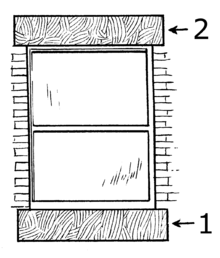sill
English
[edit]
2: Lintel
Pronunciation
[edit]Etymology 1
[edit]FromMiddle Englishsille,selle,sülle,fromOld Englishsyll,syl(“sill, threshold, foundation, base, basis”),fromProto-Germanic*sulī(“bar, sill”),fromProto-Indo-European*sel-,*swel-(“beam, board, frame, threshold”).
Cognate withScotssil,sill(“balk, beam, floor, sill”),Dutchzulle(“sill”),Low GermanSull,Sülle(“threshold, ramp, sill”),GermanSüll,Sülle(“threshold, sill”),Danishsyld(“base of a framework building”),Swedishsyll(“joist, cross-tie”),Norwegiansyll,Icelandicsyll,sylla(“sill”).Related also to GermanSchwelle( > Danishsvelle), Old Norsesvill,Latinsilva(“wood, forest”),Ancient Greekὕλη(húlē).
Noun
[edit]sill(pluralsills)
- (architecture,also "window sill")Abreast wall;window breast;horizontalbrinkwhich forms thebaseof awindow.
- She looked out the window resting her elbows on thewindow sill.
- (construction)Athreshold;horizontal structural member of a building near ground level on afoundationorpilings,or lying on the ground, and bearing the upright portion of a frame; asill plate.
- (geology)Astratumof rock, especially anintrusivelayer ofigneousrock lying parallel to surrounding strata.
- 1980,Geological Survey Professional Paper, Volume 1119,U.S. Government Printing Office:
- Minor palingenetic magmas probably were generated at this time and intruded the mantling rocks in the form of smallsillsand apophyses[…].
- 2018,Tim Flannery,Europe: The First 100 Million Years,Penguin, published2019,page55::
- The molten rock in thesillsmay have ignited vast reserves of shallowly buried natural gas, much like a match applied to a gas barbecue.
- A threshold or brink across the bottom of a canal lock for the gates to shut against.
- (anatomy)A raised area at the base of thenasalaperturein theskull.
- the nasalsill
- (military,historical)The inner edge of the bottom of anembrasure.
Usage notes
[edit]Quotations
[edit]- For quotations using this term, seeCitations:sill.
Derived terms
[edit]Related terms
[edit]Translations
[edit]
|
|
|
|
- The translations below need to be checked and inserted above into the appropriate translation tables. See instructions atWiktionary:Entry layout § Translations.
|
Etymology 2
[edit]Comparesile.
Noun
[edit]sill(pluralsills)
Etymology 3
[edit]Comparethill.
Noun
[edit]sill(pluralsills)
Etymology 4
[edit]Short forsilly.
Adjective
[edit]sill(comparativemoresill,superlativemostsill)
References
[edit]- Harris, Cyril M.. Illustrated dictionary of historic architecture. New York: Dover Publications, 1983, 1977. Groundsill→ISBN
Anagrams
[edit]Romanian
[edit]Etymology
[edit]Unadapted borrowingfromFrenchsill,fromEnglishsill.
Noun
[edit]silln(uncountable)
Declension
[edit]| singular only | indefinite | definite |
|---|---|---|
| nominative-accusative | sill | sillul |
| genitive-dative | sill | sillului |
| vocative | sillule | |
Swedish
[edit]
Etymology
[edit]FromOld Norsesíld,fromProto-Germanic*sīlą.
Pronunciation
[edit]Noun
[edit]sillc
Usage notes
[edit]- Herring from the Atlantic on Sweden's west coast is calledsill.The subspecies fished from the Baltic Sea on Sweden's east coast is calledströmming.
Declension
[edit]| nominative | genitive | ||
|---|---|---|---|
| singular | indefinite | sill | sills |
| definite | sillen | sillens | |
| plural | indefinite | sillar | sillars |
| definite | sillarna | sillarnas |
Derived terms
[edit]- fetsill
- glasmästarsill
- islandssill
- kryddsill
- lipsill
- löksill
- matjessill
- pipsill
- saltsill
- senapssill
- sillake
- sillbit
- sillbord
- sillbricka
- sillbulle
- sillburk
- sillfilé
- sillfrukost
- sillgrissla
- sillhaj
- sillinläggning
- sillkung
- sillmjölke
- sillolja
- sillperiod
- sillrökeri
- sillsallad
- sillsalteri
- sillsexa
- sillstim
- sillstrypare
- silltrut
- silltunna
- sillval
- sillåda
- skarpsill
- spickesill
See also
[edit]References
[edit]- sillinSvensk ordbok(SO)
- sillinSvenska Akademiens ordlista(SAOL)
- sillinSvenska Akademiens ordbok(SAOB)
Welsh
[edit]Etymology
[edit]See the etymology of the correspondinglemmaform.
Noun
[edit]sillf(pluralsillauorsilloedd,not mutable)
- Alternative form ofsillaf(“syllable”)
Further reading
[edit]- R. J. Thomas, G. A. Bevan, P. J. Donovan, A. Hawke et al., editors (1950–present), “sill”,inGeiriadur Prifysgol Cymru Online(in Welsh), University of Wales Centre for Advanced Welsh & Celtic Studies
- English 1-syllable words
- English terms with IPA pronunciation
- English terms with audio pronunciation
- Rhymes:English/ɪl
- Rhymes:English/ɪl/1 syllable
- English terms inherited from Middle English
- English terms derived from Middle English
- English terms inherited from Old English
- English terms derived from Old English
- English terms inherited from Proto-Germanic
- English terms derived from Proto-Germanic
- English terms derived from Proto-Indo-European
- English lemmas
- English nouns
- English countable nouns
- en:Architecture
- English terms with usage examples
- en:Construction
- en:Geology
- English terms with quotations
- en:Anatomy
- English terms with collocations
- en:Military
- English terms with historical senses
- British English
- English adjectives
- English terms with rare senses
- English slang
- English calculator words
- Romanian terms borrowed from French
- Romanian unadapted borrowings from French
- Romanian terms derived from French
- Romanian terms derived from English
- Romanian lemmas
- Romanian nouns
- Romanian uncountable nouns
- Romanian neuter nouns
- ro:Geology
- Swedish terms derived from Old Norse
- Swedish terms derived from Proto-Germanic
- Swedish terms with audio pronunciation
- Swedish terms with IPA pronunciation
- Swedish lemmas
- Swedish nouns
- Swedish common-gender nouns
- sv:Herrings
- Welsh lemmas
- Welsh nouns
- Welsh countable nouns
- Welsh non-mutable terms
- Welsh feminine nouns
- cy:Linguistics

